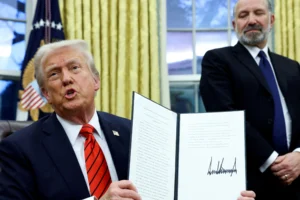MPs will vote on Friday on whether to back the prime minister’s plan for the UK to leave the EU on 31 January.
The EU (Withdrawal Agreement) Bill would also ban the government from extending the transition period – where the UK is out of the EU but follows many of its rules – past 2020.
Boris Johnson said it would end “delay and rancour” and provide “certainty”.
Opponents say the bill leaves the UK’s future uncertain, and agreeing a trade deal with the EU could take many years.
But the government insists one can be in place by the end the transition period.
The withdrawal bill, which would implement the Brexit agreement the prime minister reached with the EU in October, was introduced in Thursday’s Queen’s Speech, setting out the government’s priorities for the next year.
MPs will have their first chance to debate it in the House of Commons on Friday at its second reading – a vote on its general principles.
With the Conservatives having won an 80-seat majority at last week’s general election, the bill is expected to pass easily, before it moves on to further scrutiny by MPs and the House of Lords.
MPs have been given a further three days – 7, 8 and 9 January – to continue their debate in the Commons.
The government says it will get it into law in time for the 31 January Brexit deadline.
There are changes to the previous bill, which was backed by the Commons in October, but withdrawn by the government after MPs rejected a three-day deadline for getting it through Parliament.
The changes include:
Legally prohibiting the government from extending the transition period – during which a trade deal between the UK and EU will be discussed – beyond 31 December 2020
Allowing more UK courts to reconsider European Court of Justice rulings that have been retained in UK law after Brexit
Requiring ministers to report annually to Parliament on disputes with the EU under the prime minister’s withdrawal agreement
Repealing spent legislation that “now serves no purpose”
The bill also loses a previous clause on strengthening workers’ rights.
The government now says it will deal with this issue in a separate piece of legislation, but the TUC has warned that the change will help “drive down” working conditions.
Labour’s shadow Brexit secretary Sir Keir Starmer has described Mr Johnson’s decision to limit the length of the transition period to 11 months as “reckless and irresponsible”, adding that the prime minister is “prepared to put people’s jobs at risk”.
And Labour leader Jeremy Corbyn told MPs that Mr Johnson had “deliberately resurrected the threat of no-deal” at the end of 2020 by making this move.
He said: “We understand that people are desperate to move on. That does not mean we will just accept the prime minister’s reckless approach on how it’s done.”
What a difference a year makes.
It was back in January that Theresa May embarked on a series of Commons defeats as she tried and failed to begin the process of getting her Brexit plans approved.
It was only in October that Boris Johnson paused his own efforts when MPs rejected the proposed timetable for getting the Withdrawal Agreement through parliament.
But now, following the general election and with an 80-strong Conservative majority, things look very different.
And Boris Johnson knows it, claiming that it’s time for “certainty” after years of “delay and rancour”.
But the bill will come in for criticism. Gone are clauses about workers’ rights – Downing Street says that will be dealt with in separate legislation.
And added: a provision ruling out any extension to the transition period beyond December 2020.
The process of ratifying the Withdrawal Agreement Bill will continue in the New Year but Friday’s vote is, in part, designed to signal that the UK is now motoring towards that January 31 departure date.
Ahead of Friday’s debate, Mr Johnson said: “We will deliver on the promise we made to the people and get the Brexit vote wrapped up for Christmas.”
An earlier withdrawal agreement – reached between previous Prime Minister Theresa May and the EU – was rejected three times by MPs.
But Mr Johnson’s general election result, giving him a comfortable majority in the Commons, means it should be far easier to get his version ratified.
He said: “After years of delay and rancour in Parliament, we will deliver certainty and hard-working businesses and people across this country will have a firm foundation on which to plan for the future.
“Next year will be a great year for our country – the year we get Brexit done, boost NHS funding, invest in infrastructure and level up access to opportunity and prosperity across our great nation.”
In the 2016 referendum, the UK voted by 52% to 48% to leave the EU. But the subsequent difficulties in getting Brexit through Parliament have caused gridlock at Westminster.
The result of the Commons vote on the bill is expected at about 15:00 GMT on Friday.
Source: BBC






















